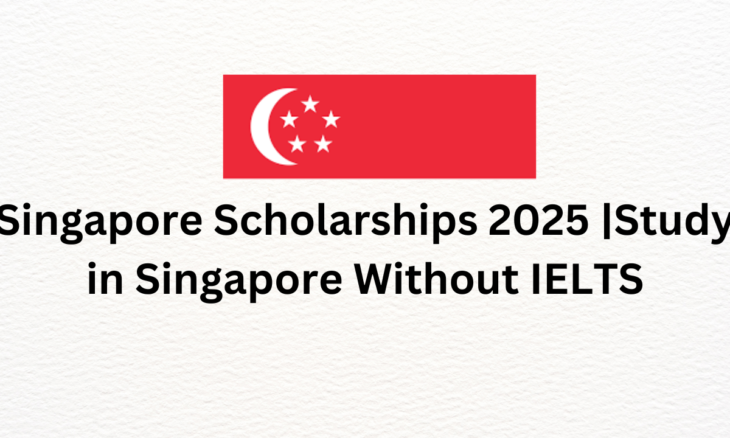
Singapore, a vibrant hub of innovation and global connectivity, beckons ambitious students worldwide. Imagine pursuing your academic aspirations in a world-class education system, surrounded by cutting-edge technology and a diverse, multicultural environment. The good news? This dream can become a reality with the numerous Singapore scholarships available for 2025. Even better news for many international students: some of these scholarships offer the incredible opportunity to study in Singapore without the often-required IELTS score.
This post will delve into the exciting world of Singapore scholarships for 2025, highlighting opportunities for students seeking to bypass the IELTS requirement and embark on an enriching academic journey in this dynamic nation. Get ready to explore eligibility criteria, application processes, and the diverse range of scholarships that could pave your way to a brighter future in Singapore!
List Of Singapore Scholarships for International Students 2025
1. Nanyang Scholarship at Nanyang Technological University (NTU)
- For: High-achieving students with leadership potential.
- Eligibility: Excellent academic record (high school or equivalent), demonstrated leadership, and active extracurricular involvement.
- Benefits: Full subsidized tuition, SGD 6,500 annual living allowance, up to SGD 2,000 annual accommodation allowance (for NTU hostels), up to SGD 7,500 travel grant (for overseas programs, conditions apply), and a one-time SGD 1,750 computer allowance.
- Learn More: Visit the NTU Scholarships page.
2. Singapore International Graduate Award (SINGA)
- For: International graduates passionate about research.
- Eligibility: Open to all nationalities, strong academic record, excellent written and spoken English, and positive academic references.
- Benefits: Full tuition fees, SGD 2,000 monthly stipend (increasing to SGD 2,500 after the Qualifying Examination), one-time SGD 1,500 airfare grant, and a one-time SGD 1,000 settling-in allowance.
- Learn More: Visit the official SINGA website.
3. Lee Kong Chian Graduate Scholarships at National University of Singapore (NUS)
- For: Students pursuing PhD programs at NUS.
- Eligibility: Applying for NUS PhD programs, outstanding academic record, demonstrated leadership, and community service involvement.
- Benefits: Full tuition fees, SGD 3,300 monthly stipend, SGD 500 annual book allowance, SGD 1,500 computer allowance, and conference travel support.
- Learn More: Visit the NUS Scholarships page.
4. ASEAN Undergraduate Scholarship at NUS
- For: Citizens of ASEAN member countries (excluding Singapore).
- Eligibility: Strong academic record, demonstrated leadership qualities, and participation in co-curricular activities.
- Benefits: Full tuition fees (after MOE Tuition Grant Subsidy), SGD 5,800 annual living allowance.
- Learn More: Visit the NUS Undergraduate Scholarships page.
5. Singapore Management University (SMU) Global Impact Scholarship Award
- For: Students with strong academic records and leadership skills.
- Eligibility: Outstanding academic results, demonstrated leadership and communication skills, and active involvement in extracurricular activities and community service.
- Benefits: Full tuition fees, SGD 5,000 annual living allowance, one-time SGD 1,800 computer allowance, SGD 5,000 global exposure grant, and a guaranteed offer for an SMU-sponsored overseas student program.
- Learn More: Visit the SMU Scholarships page.
6. INSEAD-Syngenta MBA Scholarships for Developing Country Leaders
- For: Candidates from developing countries with demonstrated financial need, admitted to the INSEAD MBA program.
- Eligibility: Citizens of developing countries, admitted to the INSEAD MBA program, and demonstrated financial need.
- Benefits: Up to €22,500 in scholarship funds.
- Learn More: Visit the INSEAD Scholarships page.
7. Singapore University of Technology and Design (SUTD) President’s Graduate Fellowship
- For: Outstanding graduates passionate about research.
- Eligibility: Strong academic record and a passion for research.
- Benefits: Full tuition fees, monthly stipend (SGD 3,000 for Singapore Citizens, SGD 2,500 for Singapore Permanent Residents, and SGD 2,200 for International Students), and conference funding support.
- Learn More: Visit the SUTD website (specific scholarship page may vary).
8. Lee Kong Chian Scholars’ Programme at Singapore Management University (SMU)
- For: High-achieving students with strong leadership qualities.
- Eligibility: Outstanding academic results, demonstrated leadership and communication skills, and active involvement in co-curricular activities and community service.
- Benefits: Full tuition fee coverage, SGD 16,000 Global Opportunities grant, SGD 5,000 annual living allowance, and a one-time SGD 1,800 computer allowance.
- Learn More: Visit the SMU Scholarships page.
9. SUTD Global Excellence Scholarship at Singapore University of Technology and Design (SUTD)
- For: Undergraduate applicants with strong leadership potential.
- Eligibility: Open to all nationalities applying for SUTD undergraduate programs, demonstrated strong leadership potential, and a stellar academic record.
- Benefits: Covers subsidized tuition fees (after Tuition Grant) for up to four years, SGD 9,000 grant for approved overseas programs, and a SGD 7,000 allowance every two terms.
- Learn More: Visit the SUTD Scholarships page.
10. GIC Scholarship Programme
- For: Students from all disciplines (except Medicine and Dentistry) with excellent academic and co-curricular records.
- Eligibility: Open to students of all disciplines except Medicine and Dentistry, excellent academic results, and strong co-curricular achievements.
- Benefits: Covers tuition and mandatory fees, monthly living stipend, and a one-time allowance for pre-studies needs (including return airfare, warm clothing, and settling-in expenses).
- Learn More: Visit the GIC Scholarships page.
How To Study In Singapore Without IELTS
Here’s how:
- Find universities that don’t require IELTS.
While most Singaporean universities require IELTS scores, there are a few exceptions. Some universities may waive the IELTS requirement if you have completed your previous degree in English or if you are a native speaker of English. You can find a list of universities that don’t require IELTS on the websites of the universities themselves.
- Provide alternative proof of English proficiency.
If you can’t find a university that doesn’t require IELTS, you can still provide alternative proof of your English proficiency. This could include a TOEFL score, a letter from your previous university stating that you are proficient in English, or a personal statement demonstrating your English language skills.
- Apply for a student visa.
Once you have been accepted to a university, you will need to apply for a student visa. The Singaporean government does not require IELTS scores for student visas, so you can apply for a visa even if you don’t have an IELTS score.
- Prepare for your studies.
Once you have your student visa, you can start preparing for your studies in Singapore. This includes finding accommodation, packing your bags, and getting your finances in order.
- Arrive in Singapore and start your studies.
Once you arrive in Singapore, you can settle in and start your studies. Make sure to attend all of your classes, complete your assignments, and participate in extracurricular activities.
Don’t Need IELTS to Study in Singapore? Alternative English Tests for 2025
However, some commonly accepted alternatives to IELTS include:
- TOEFL (Test of English as a Foreign Language): A globally recognized standardized test, TOEFL assesses your reading, listening, speaking, and writing skills. Both the internet-based test (iBT) and the paper-delivered test are often accepted. Check with your university for their preferred format.
- PTE Academic (Pearson Test of English Academic): This computer-based test evaluates your English skills in a realistic, academic context. It’s becoming increasingly popular and is recognized by many institutions worldwide, including those in Singapore.
- Duolingo English Test: This online test offers a convenient and affordable way to demonstrate your English proficiency. Its shorter format and accessibility have made it a popular choice for students. However, acceptance varies, so confirm with your target university.
- Cambridge English Qualifications (C1 Advanced/C2 Proficiency): These in-depth assessments from Cambridge Assessment English are highly regarded and demonstrate advanced English language skills. C1 Advanced (formerly CAE) and C2 Proficiency (formerly CPE) are often considered as proof of proficiency for university admission.
- MUET (Malaysian University English Test): While primarily designed for Malaysian students, some Singaporean institutions might consider MUET scores, especially for specific programs or partnerships. It’s best to inquire directly with the university.
List Of Universities to Study in Singapore Without IELTS
Here are some universities to research:
- National University of Singapore (NUS): While NUS generally prefers IELTS, they do consider other qualifications. Check their specific requirements for your chosen program.
- Nanyang Technological University (NTU): Similar to NUS, NTU may accept alternatives to IELTS. Contact their admissions office for details.
- Singapore Management University (SMU): SMU’s admissions criteria can vary. Explore their website or contact them to see if they accept alternatives to IELTS for your program of interest.
- Singapore University of Technology and Design (SUTD): Research SUTD’s admission policies regarding English language proficiency.
- Singapore Institute of Technology (SIT): Inquire about SIT’s requirements and whether they consider alternatives to IELTS.
- Other Private Universities: Many private universities in Singapore may have more flexible English language requirements. Research institutions like the Management Development Institute of Singapore (MDIS), Kaplan Singapore, and PSB Academy, but always confirm their policies.
Conclusion
Securing a scholarship to study in Singapore can be a transformative experience, opening doors to world-class education and a vibrant cultural landscape. As we’ve explored, the path to achieving this dream doesn’t necessarily require IELTS. By understanding the landscape of available scholarships, diligently researching specific requirements, and exploring alternative English proficiency tests, you can significantly increase your chances of success.
